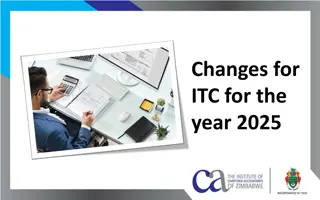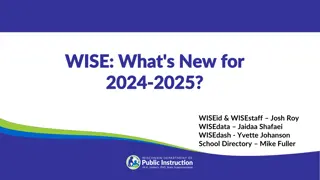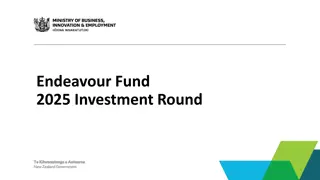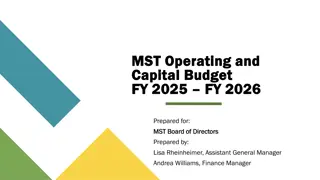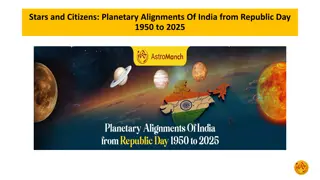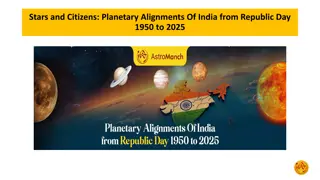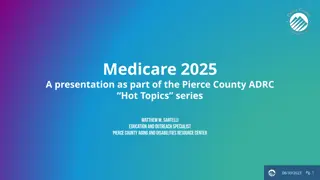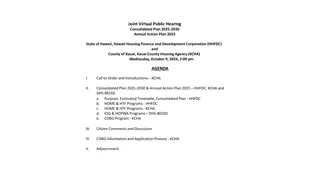
Talking About Future Plans and Decisions in English
Learn how to discuss future plans, intentions, and predictions using "going to" and "will" in English. Explore sentence structures, usage guidelines, and examples for each form.
Download Presentation

Please find below an Image/Link to download the presentation.
The content on the website is provided AS IS for your information and personal use only. It may not be sold, licensed, or shared on other websites without obtaining consent from the author. If you encounter any issues during the download, it is possible that the publisher has removed the file from their server.
You are allowed to download the files provided on this website for personal or commercial use, subject to the condition that they are used lawfully. All files are the property of their respective owners.
The content on the website is provided AS IS for your information and personal use only. It may not be sold, licensed, or shared on other websites without obtaining consent from the author.
E N D
Presentation Transcript
Medical physics Medical physics Department Subject: English Language Subject: English Language Class: Third Class: Third Lecturer: MSC. Lecturer: MSC. Sakina Sakina Hussain Department Hussain Alsuwaydi Alsuwaydi Lecture: Lecture: ( ( 6 6) ) Future intentions: going to and will: How to talk about future plans and decisions. How to talk about future plans and decisions. Study Year: 2024-2025
Why Do We Talk About the Future? We use future tenses to discuss: 1. Plans and intentions. 2. Predictions about the future. 3. Promises and spontaneous decisions.
Introduction to Future Forms There Two common ways to talk about the future: Going to for planned actions Will for spontaneous decisions and predictions Example: -I m going to buy a new phone next week. (Planned) -I will help you with your bags. (Decided now)
Going to When to Use It? Use going to for: 1. Future plans (I m going to study Spanish.) 2. Future intentions (She is going to start a business.) 3. Predictions based on evidence (Look at the clouds! It s going to rain.)
Going to Sentence Structure Formula: Subject + am/is/are + going to + base verb Subject + am/is/are + going to + base verb Examples: -She is going to travel next year. -We are going to move to a new city.
Will When to Use It? Use will for: 1. Instant decisions (I m thirsty. I will get some water.) 2. Promises (I will always be your friend.) 3. Predictions without evidence (I think it will snow tomorrow.) 4. Offers and requests (I will help you with your homework.)
Will Sentence Structure Formula: Subject + will + base verb Subject + will + base verb Examples: -She will call you later. -They will win the match.
Negative Forms Going to : She is not going to study tonight. Will : He will not (won t) come to the party. Examples: -I am not going to eat junk food. -She won t forget your birthday. -Image: A red X over a calendar.
Question Forms Going to : Are you going to watch the movie? Will : Will she be here tomorrow? Examples: -Is she going to travel next year? -Will you help me with my homework?
Common Mistakes -Incorrect: She will going to study tonight. -Correct: She is going to study tonight. -Incorrect: He will to call you later. -Correct: He will call you later. .
Predictions Going to vs. Will Use going to when there is evidence that something will happen. -Example: Look at those dark clouds! It s going to rain. (You can see the clouds, so you have evidence.) Use will when making a general guess or assumption about the future without clear evidence. -Example: I think she will be a great doctor one day. (There s no proof, it s just an opinion or belief.)
What do you think will happen? Should we use going to or will ?
A Baby Trying to Walk -Going to: Look! The baby is standing up and taking small steps. He is going to walk soon! (We can see the baby trying, so there is evidence.) -Will: One day, this baby will run very fast. (This is just a general prediction without immediate evidence.)
Interactive Exercise Fill in the Blanks Complete the sentences: 1. Look at that car! It __ (crash) into the wall. (Going to or will?) 2. I feel sick. I __ (call) the doctor. 3. She __ (study) medicine next year.
Speaking Activity Future Plans -Use going to for personal plans. -Use will for promises or spontaneous decisions. Example: A: What are you going to do next summer? B: I m going to visit my cousins. A: Oh! That s nice. think I will take a short trip too!
Conclusion & Final Activity Summary: -Use going to for plans & evidence-based predictions. -Use will for instant decisions, predictions, and promises.

